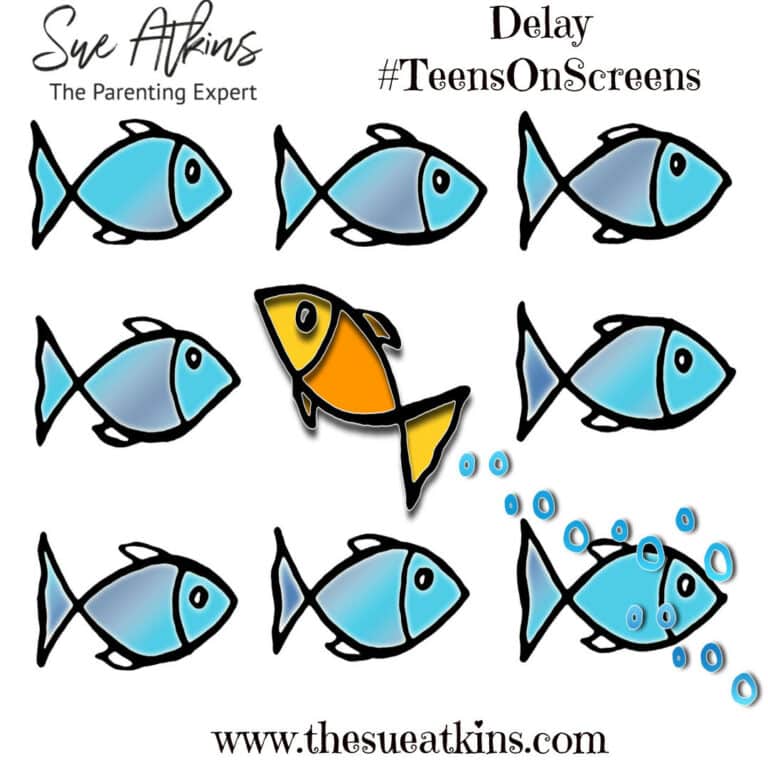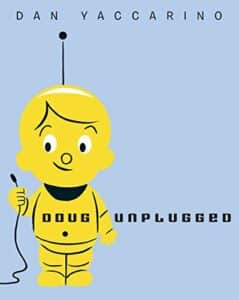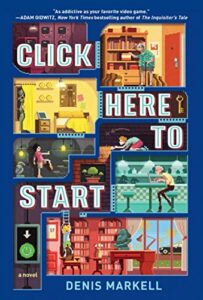I have begun campaigning around delaying #TeensOnScreens but the hard work begins much earlier than that – with parents being brave around limiting smartphones until kids are 14.
While there are certainly benefits to smartphones, delaying their use until age 14 allows children to mature emotionally, socially, and cognitively before facing the potential challenges and distractions that come with smartphone ownership.
My approach is simple: Delay #TeensOnScreens !
You can download my Saying ‘No’ to Smartphones until Aged 14 – Tips & Scripts for Parents PDF here
But I’m a great believer that you can start BIG conversations with little people at any age and reading books is a great way to start.
Here are some children’s books aimed at the 3-7 age range that address the topic of smartphones or screen time in a child-friendly manner:
“Doug Unplugged” by Dan Yaccarino:
This charming picture book tells the story of a robot named Doug who explores the world beyond his computerised existence, encouraging young readers to take a break from screens and experience the real world.
“My Very, Very Smallest Screen” by Lauren Child:
This delightful book follows the adventures of a little girl who discovers a tiny screen and all the amazing things she can do with it, but ultimately learns that there’s more to life than staring at a screen.
“The Berenstain Bears and Too Much Screen Time” by Stan and Jan Berenstain:
In this classic picture book, the Berenstain Bears learn about the importance of balancing screen time with other activities.
“The Little Red Hen: A Computer-Generated Adaptation” by Roser Capdevila:
In this modern twist on a classic tale, the Little Red Hen learns about the value of teamwork and collaboration in the digital age.
“Hello, I’m Here!” by Helen Frost and Rick Lieder:
This beautifully illustrated book celebrates the wonders of the natural world and encourages children to put down their devices and explore the world around them.
These books can help young children understand the importance of balancing screen time with other activities, as well as encourage them to engage with the world around them in meaningful ways.
Here are a few examples for 7 -10 year olds
“Dot.” by Randi Zuckerberg: This picture book tells the story of a girl named Dot who learns the importance of finding a balance between her digital devices and the real world. It’s a great conversation starter for discussing healthy technology habits with kids.
“Goodnight Smartphone” by Arianna Huffington: This book uses humour to gently remind both kids and adults about the importance of unplugging from technology before bedtime.
“Screens and Teens: Connecting with Our Kids in a Wireless World” by Kathy Koch: This book is written specifically for parents but contains insights that can be adapted for discussing technology with children aged 7-10.
“The Smartest Kid in the Universe” by Chris Grabenstein: While not solely focused on smartphones, this middle-grade novel features a young protagonist who must navigate a world where technology is both helpful and potentially dangerous. It prompts readers to think critically about their relationship with technology.
“Be Kind” by Pat Zietlow Miller: This book explores the power of kindness in an increasingly connected world. While not explicitly about smartphones, it encourages children to consider the impact of their online interactions and the importance of treating others with empathy and respect, which can be related to smartphone use.
“Hello Ruby: Adventures in Coding” by Linda Liukas: This interactive picture book introduces basic coding concepts to children in a fun and engaging way. While it promotes technology literacy, it also encourages kids to think critically about how they engage with digital devices.
These books can help children understand the potential risks and benefits of technology while encouraging them to develop healthy habits and digital literacy skills from a young age.
“How to Be a Lion” by Ed Vere: While not explicitly about smartphones, this book teaches children about the importance of being true to oneself and not following the crowd, which can indirectly relate to the pressure of social media.
For the 11-16 age range, there are several books that address the impact of smartphones and technology on teenagers, as well as broader themes related to digital literacy and online safety.
Here are some recommendations:
“Click Here to Start” by Denis Markell: This middle-grade novel follows the adventures of a boy who discovers a mysterious puzzle hidden within his late grandfather’s collection of books. As he delves deeper into the puzzle, he learns about the power of gaming and technology, as well as the importance of real-life connections.
“Reclaiming Conversation: The Power of Talk in a Digital Age” by Sherry Turkle: While aimed more at older teens and young adults, this book offers valuable insights into the impact of smartphones and social media on communication and relationships. It encourages readers to prioritize face-to-face conversations and meaningful connections in an increasingly digital world.
“Digital Minimalism: Choosing a Focused Life in a Noisy World” by Cal Newport: This book explores the concept of digital minimalism and offers practical advice for reducing screen time and reclaiming control over one’s digital life. While not specifically for teenagers, it contains valuable lessons that can be applied to their own relationship with technology.
“The Circle” by Dave Eggers: This dystopian novel follows a young woman who lands a job at a powerful tech company that dominates every aspect of people’s lives through its all-encompassing social media platform. It offers a thought-provoking commentary on the dangers of surveillance, online privacy, and the pursuit of constant connectivity.
“The Tech-Wise Family: Everyday Steps for Putting Technology in Its Proper Place” by Andy Crouch: Written from a Christian perspective, this book offers practical advice for families on how to create healthier technology habits and cultivate deeper connections with each other. It includes tips and strategies that teenagers can apply to their own lives.
These books can help teenagers navigate the challenges of growing up in a digital age and make informed decisions about their use of smartphones and technology. They also encourage critical thinking about the impact of technology on society and personal well-being.
For parents:
“The Big Disconnect: Protecting Childhood and Family Relationships in the Digital Age” by Catherine Steiner-Adair: Although aimed more at parents and educators, this book offers valuable insights into the impact of technology on family life and provides strategies for finding balance.
“Digital Detox: The Ultimate Guide to Beating Technology Addiction” by Damon Zahariades: While not specifically for children, this book offers practical tips and advice that parents can adapt to help their children develop healthy habits around technology use.
These books can serve as conversation starters for parents and children to discuss the potential pitfalls of excessive smartphone use and ways to maintain a healthy relationship with technology.












